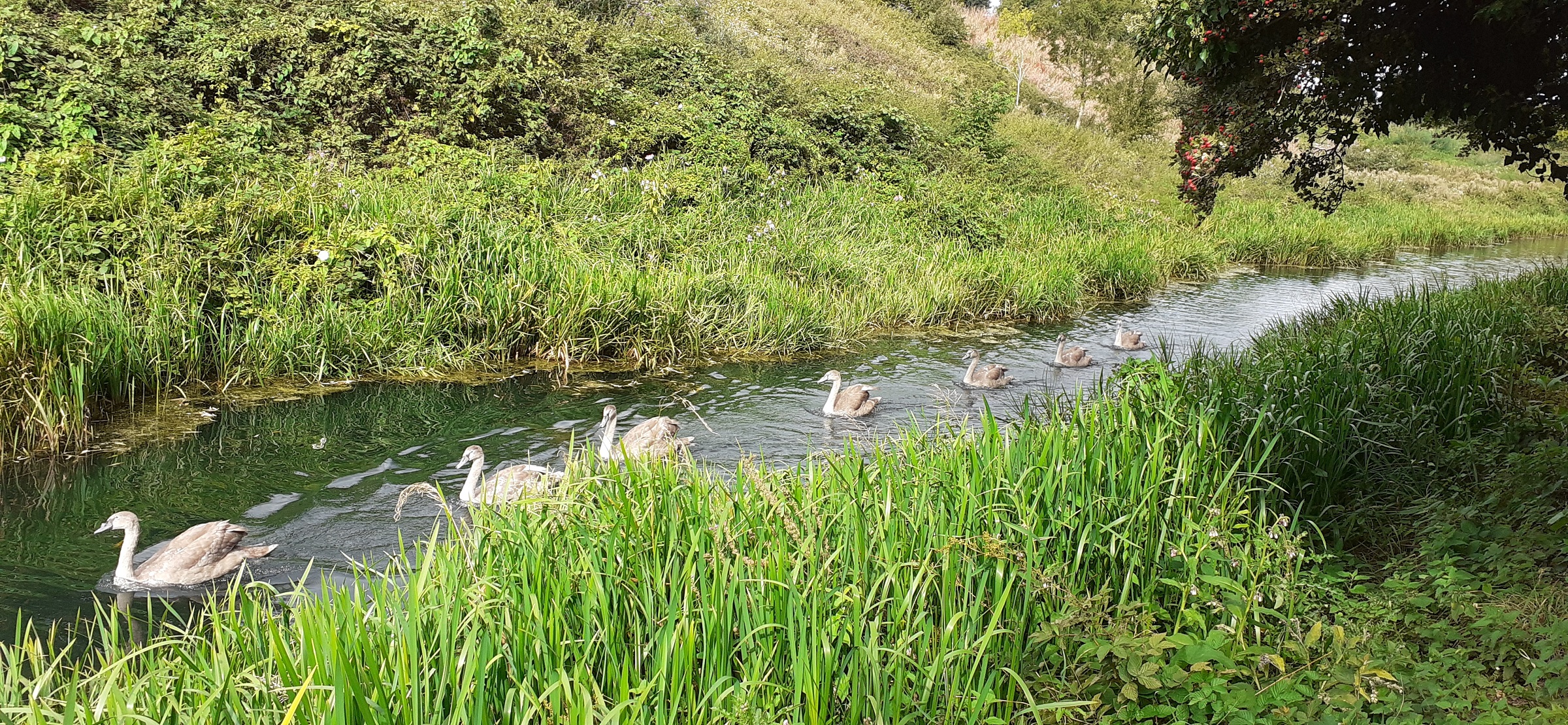I love this photo: the pure joy of it. Seven well grown cygnets, surely soon to doff their dun-coloured outfits and don the white radiance of debutantes (male and female), set off gaily in the wake of their parent (out of shot), who flaps away ahead of them down the Stroudwater Canal. I love how the water itself seems to dance its way along in the late summer sunlight with an energy of its own, barely obeying the laws of physics.
Nor are the cygnets ‘ugly ducklings’. By whose measure should the soft browns and buffs of nature, full of subtle beauty and worn with such elegance by these nearly grown juveniles, be deemed anything other than lovely.
When I took the photo I was gratified to include all the cygnets of the brood. Only now do I reflect that ‘seven swans a-swimming’ is a pleasing number to have photographed. As a professional writer, I’m more drawn to the word cygnet. It’s potentially useful for Scrabble and has that conjunction of ygn in the middle. More pertinently, I now notice (as someone with synaesthesia) that its colours match those of its subject rather beautifully. The pale silvery blue of c segues into the warm buff of y, which in turn blends with the gold of the g… then back to a firm nut brown for n (the little ygn group corresponding with the colours of the cygnets), then two shades of dark green for e and t. These are my personal colours, but they are, indeed, the colour scheme of the photo – perhaps a secondary reason I found this picture satisfying.
There are other reasons. The independence of nature to get on with doing ‘its thing’ despite the bullying dominance of the humans on all sides is reassuring. Thank goodness animals are so resilient, so sure of who they are (these cygnets aren’t stopping to wonder whether they’re ducklings), so committed to just getting on with the matters of basic necessity and importance: fresh air, exercise, doing things as a team, going off to find lunch, enjoying life. Today, this seems like a wonderfully simple and very apposite message as I contemplate a chaos of to-do lists and make my usual feeble attempts to parry the omnipresent existential misgivings.
The photo, however, does not tell the full story (as is often the case with human idylls), and the insouciance of the cygnets in fact owes a debt to the parent, who had set off ahead of them to clear the way. A human kayaker further along was blocking their route, and the parent swan took to the air with great force and authority, and flew vehemently up behind him. Eventually the swan had its way: after several such heavy hints the young man gave in and left to find a new spot. Sometimes nature does defend its boundaries.
A final reflection on this scene is another word-related one. The word cygnet has a homophone in signet. In a month when, as a nation, the British people have said goodbye to a monarch of seventy years’ standing – the concept of a mark of authority, a seal of approval, is an interesting one. Who decides what is to be approved, and who approves it? A new prime minister decides, and a new monarch approves; neither of them elected by the people. Not that I’m a republican (I’m not), but this places us in a position, some of us for the first time, of just questioning how safe we feel with this arrangement. As the political kayaker forges ahead according to preconceived routines, do we now need a vehement swan to make a clean sweep and put nature front and centre? If I held the signet of approval, I would look at the prime minister, then across at nature as a benchmark. How will this policy affect what matters to us most – our environment? If nature likes it – if the swan and its seven joyous cygnets are safe – then maybe I’ll stamp my signet on that piece of paper.


Leave a Reply